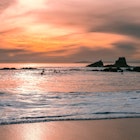
The most epic surf spots in the US according to pros
Aug 13, 2020 • 11 min read

Lonely Planet asked the experts to share the US surf spots that are special to them © mattpaul / Getty Images
The first time a surfer packs up their board and sets off in search of a new wave is probably the day they realise their favorite break has become too crowded. This was how surf travel started, with adventurous wavehounds scouring the globe for virgin swell, guarding hand-marked nautical maps and saying nothing to anyone. Indeed, surfers have always had a special knack for describing waves, conditions, even the landscape, all without revealing the location (or even the continent) that they’re talking about. But secrets never last – especially surf secrets.
In Lonely Planet's new book, Epic Surf Breaks of the World, professional surfers share what makes these top seven US surfing spots so special to them.

Malibu, California
Former pro Jamie Brisick has traversed the globe in search of swell. Here's why he loves this well-known wave off the coast of Los Angeles.
"Located 23 miles (37km) north of LAX, and also known as Surfrider Beach, Malibu is where Gidget (1959) happened. It’s where the great design leap that was the Malibu Chip board – smaller, lighter, more manoeuvrable – happened. It’s where Miki Dora famously dropped his shorts at the judges, media and spectators in the 1967 Malibu Invitational. And it’s where Big Wednesday (1978), set in a fictional Malibu, effectively happened. There might be better-quality waves in California, but nowhere holds more notches in the belt of surf history.
"Malibu is a kind of anarchic experiment that somehow works. It teaches us about our surfing selves. I’ve seen terrible fights over waves. I myself have barked at dropper-inners, and fallen into pathetic bouts of wave rage. But over the decades I’ve come to learn that the only way to surf Malibu is with levity. You will get dropped-in on, that’s a simple fact of surfing there. The key is to laugh, to practice humility, to be grateful for whatever little piece of peeling water the wave-gods send your way."
Type of wave: Right-hand point break. First Point is the most machine-like, but Second and Third offer racy, less
crowded peelers.
Things to know: Longboards tend to be the equipment of choice at First Point, shortboards and hybrids at Second and Third. The lineup here is friendly, but respect the crowd.

Mavericks, California
In this excerpt from his book, The Fear Project, Jaimal Yogis recounts his insane journey to surfing and surviving his very first monster wave in California.
"I’m a little hesitant to call what happens next letting go. It’s a more primal surrender to whatever outcome – yes, even death – and a simultaneous sharpening of the senses. Instead of feeling weaker by embracing fear, I’m flooded with a surge of power. And as soon as this mental shift comes, I’m almost magically in position. The wave is coming right to me, too fast it seems, but I don’t care.
"I turn my board toward land and paddle. Suddenly, I’m on my feet looking over the mountain’s precipice, and when it boosts to full height, the whole ocean hiccups. I scream down the wall so high above me, it’s perfectly surreal. I look over my left shoulder at the houses of whitewater and they are just there, just houses of whitewater. Everything is big and beautiful and fast. I ride a football field of water, thinking nothing at all, the avalanche on my heels. The wave flattens, then reforms into a second frothy bowl. I drop down this ledge, half the size of the original. It slingshots me forward. Then, seeing the wave is going to close, I pull off the back, skimming and skimming and skimming across the flat sea.
"Lying down on my board, there’s a moment before I snap out of my trance and realise what has just happened. The fear has dissolved. It will be back, of course, but for now, there is this moment when only faith remains. And I belong here. I belong here, too. And while I don’t know it yet, for weeks, months, even years to come, the memory of this one wave, the raw joy, will permeate my life and alter it."

Cortes Bank, California
Pro big-wave surfer Greg Long is one of the most powerful watermen on the planet and a pioneer in his sport. Here's why Cortes Bank is his number one surfing spot.
"Cortes Bank is 100 miles (160km) off the California coast. There’s no landmass in sight. The waves get pulled up from 2000ft below, and then they hit this huge seamount really abruptly. The currents out there are really extreme. Cortes has tons of weird boils and deep spots. I was drawn to it because it was just such an unknown frontier, a bit mysterious, and no one really knew all of its faces. And coming into my 20s, I was looking for the greatest challenge I could find in big-wave surfing. I felt it was possible that I had the greatest big wave in the world right at my back door. Based on its symmetry, I felt it had the potential to hold surfable 100ft waves.
"Its unknown is what’s so appealing about it. Your horizon line extends 360 degrees, so you’ve got no reference point as to where you are in the lineup. We actually drop three buoys – one on the inner part of the lineup, one outside and a little bit wide of the channel, and one out back – and use those as points of reference. Often things go bizarrely quiet – just this stillness that literally makes you feel like you’re on the edge of the earth."
Type of wave: The Cortes Bank A-frame breaks off an underwater island. Locals believe that in the right swell
conditions, it could hold a rideable 100ft (30m) wave.
Things to know: This is a wave for the world’s best bigwave surfers only. It starts and ends in water deeper than
1000ft (300m), and waves here are reported to move 50% faster than those on the North Shore of Hawaii, making
paddling into them almost impossible. Instead, most surfers get towed into them on a Jet Ski.

Sunset Beach, Hawaii
O‘ahu’s North Shore, Hawaii, is surfing’s ultimate testing ground. Beau Flemister says his lifetime of sessions at Sunset are what define him as a surfer.
"I wanted to ride a big board and challenge myself – and for that, there’s always good ol’ Sunset Beach, the OG of big-wave surf spots, a spot that can hold a wave bigger than 12ft (Hawaiian size) without closing out. The thing about surfing Sunset Beach on a bigger day is that whether you actually catch a set wave or get your ass handed to you, you always feel like you’ve accomplished something. You were out there that day, a feat in itself.
"Predictably unpredictable, straying from the relative safety of a giant channel, the playing field out at Sunset is just as they say – way larger than it looks. Be it the currents, the shifting peaks or the utter space in the lineup, it’s easy to get lost out there. Whereas, at 10ft Pipe, you can avoid the peak and dip in and out of the pack from the channel, 10ft Sunset has a way of sneaking up on you – like a truck rounding a corner when you thought it was safe to cross. Many say that a 12ft day at Sunset is more hectic than an 18ft day at Waimea Bay."
Type of wave: A powerful, consistent right-hand reef break.
Things to know: A bigger board – over 8ft – is recommended. Not only is it fun, but you’ll catch more waves. It’s very easy to get caught inside at Sunset, because the waves move fast. If you paddle for a wave here, commit.

Outer Banks, North Carolina
The East Coast of the US has plenty of great waves. But none, says Matt Pruett, have the raw power and wild setting of those that break off North Carolina’s barrier islands.
"As a teenage transplant in the early 1990s, I was seduced. The Outer Banks to me back then was romantic. It was punk. It was haunting. But perhaps more important than anything else, it was where I first got barreled. Tubed. Pitted. Slotted. Piped. Shacked… Whatever you want to call it, getting barreled is the absolute zenith of the surfing experience, and a milestone for any grommet. Before experiencing my first legit tube at Rodanthe Pier that day – getting behind the curtain, over the foam ball, out with the spit – I was just another kook from Virginia. Immediately afterward, however, I remember thinking to myself: ‘I’m gonna move here.’ I even remember whispering to myself ‘then live here until I die.’
"I can’t remember the exact high school melodrama that had me so edgy that day, but whatever it was got swiftly silenced in sea foam, drowned in heaving saltwater and smashed to detritus atop a shallow sandbar. The thrills were nonstop. Every time I surfed, my wave count was through the roof. And I wasn’t even very good yet. Nevertheless, these heaving emerald bombs detonated all around me, equally grotesque and gorgeous, with no one mining them but me. I never saw another surfer all day long."
Type of wave: Beach breaks.
Things to know: Bring all your wetsuit gear, regardless of season. The upwelling that often accompanies summertime offshores can cause water temperatures in the Outer Banks to plummet. Also, a gunnier surfboard with a bit more volume up front might help for taking steep, late drops.

Trestles, California
Southern California’s premiere high-performance wave is so good that the entire American surf industry wanted to be near it. Chris Dixon came chasing the same dream.
"Middles became my go-to. It’s less consistent, but it’s also less crowded, and the vibe is mellow. One clear winter morning in 1999, I paddled out at Middles before dawn. Save for a small pod of dolphins, I was all alone. The biggest set waves were about 3ft overhead, but thanks to the warm Santa Ana winds howling offshore, they were throwing out perfect almond-eyed barrels.
"Out on the horizon, a big North Pacific set reared up. Sprinting hard, I narrowly scratched over the first wave; 12 strokes behind it loomed the wave I’d been waiting for all my life. As I dug for it atop an undersized 6’2” thruster, I remember catching a glimpse of the snowcapped Santiago Peak to the east. I was blinded by the spray, taking off by feel alone. Then my vision cleared as I went into freefall with the lip. I was terrified my fins would fail to hold as I reached the wave’s trough. But they did. The curl of the wave arced over my head. Then 3ft (1m) ahead, a pair of dolphins launched out of the wave’s translucent face. I hollered and laid turn after parabolic turn as the wave unspooled for 500ft. It was – and remains – the best wave I had ever surfed."
Type of wave: Left- and right-hand point breaks.
Things to know: Since the waves at Middles and Church typically move more slowly than the others, they’re better for bigger boards. If you surf a longboard at Lowers, you’ll get barked at if you use it to hog the waves. If Trestles is packed, head south on Pacific Coast Hwy to the Trails beaches.

Ditch Plains, New York
Just a few hours east of New York City, Montauk is a surf town like no other, with a surprisingly great point break. Chas Smith soaks in the over-the-top scene.
"A broad stretch of sandy beach that draws the most consistent swell on Long Island, Ditch Plains has been a surfing mecca, of sorts, since the early 1960s. In summer, the waves are silky, warm and predictably packed; in winter, they are mind-bendingly freezing, but can get ridiculously good. And the scene in the water is as entertaining as on land: I once found myself in the lineup with five male models who were in town celebrating a famous Hollywood producer friend’s 40th birthday. The models wanted to go surfing, so I took them. I also took their waves, while they struggled with their 9ft soft-tops.
"At Ditch, hardcore locals mix fluidly with Rolex-wearing stockbrokers, who drop in on runway models wearing Rip Curl trucker hats and pastel springsuits. It is the sort of crowd that would infuriate you elsewhere. But for some reason, here in Montauk, it is an endlessly fun cross-section of surf culture: real surfers, fake surfers, non-surfers, aspiring surfers."
Type of wave: Rock-reef A-frames.
Things to know: Ditch Plains is the wave that is easiest to access and breaks most consistently, making it wildly, seriously crowded in warm summer months. Like, seriously crowded. Enjoy the party, and party-waves.
Want more surf secrets from the US and beyond? These excerpts are from Lonely Planet's new book Epic Surf Breaks of the World, available to order now.
Explore related stories
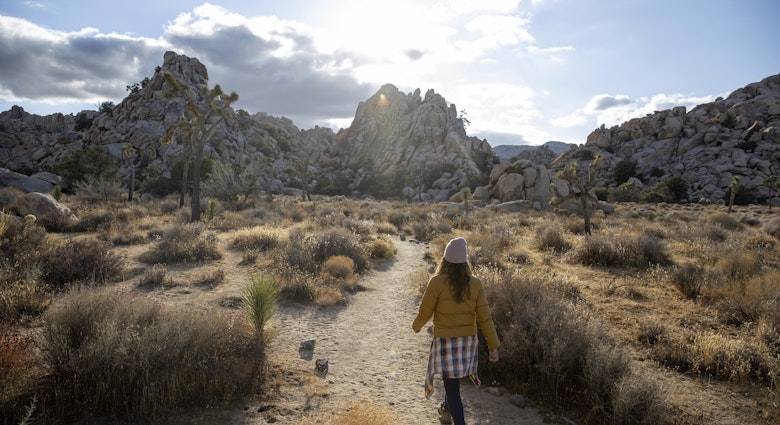


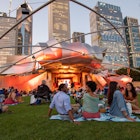
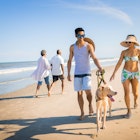 BeachesNorth Carolina's top 16 beaches for swimming, surfing and sea turtles
BeachesNorth Carolina's top 16 beaches for swimming, surfing and sea turtlesAug 26, 2024 • 12 min read
 BeachesWhere are the best beaches in the US? Check out these 28 shoreline destinations to explore and enjoy.
BeachesWhere are the best beaches in the US? Check out these 28 shoreline destinations to explore and enjoy.Aug 21, 2024 • 24 min read
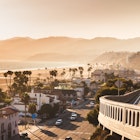 ActivitiesThe perfect day in LA: how to spend 24 hours in the City of Angels
ActivitiesThe perfect day in LA: how to spend 24 hours in the City of AngelsAug 16, 2024 • 6 min read
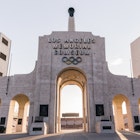
 AstrotourismJoshua Tree National Park: everything a first-time visitor could want to know
AstrotourismJoshua Tree National Park: everything a first-time visitor could want to knowJul 19, 2024 • 10 min read

